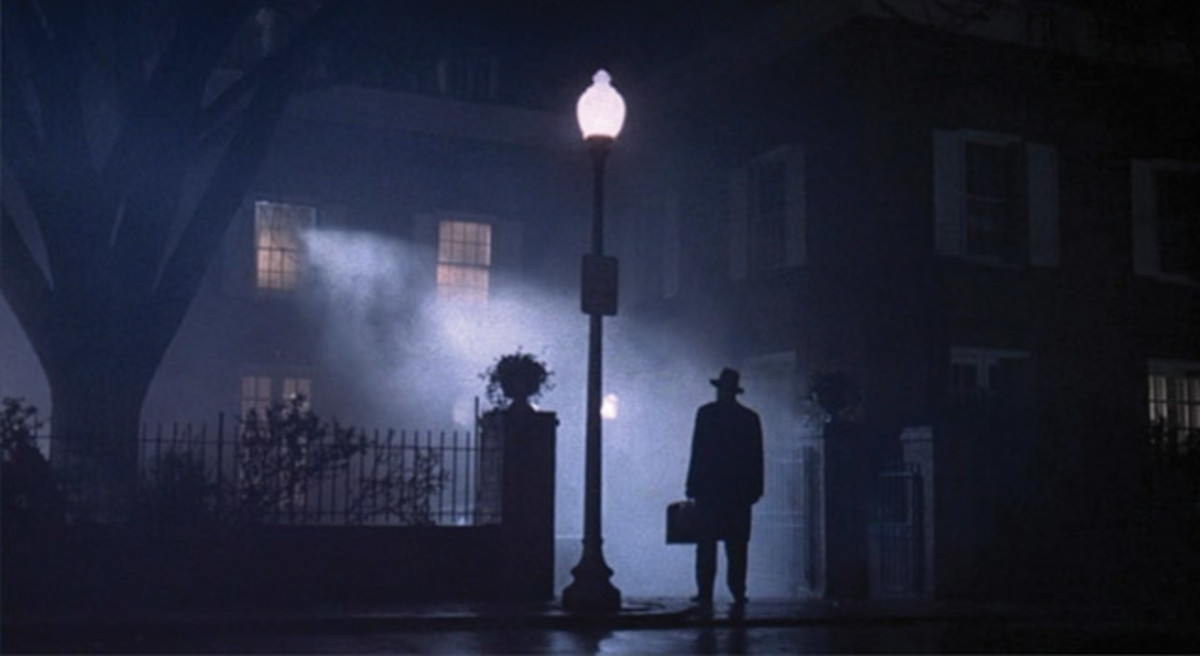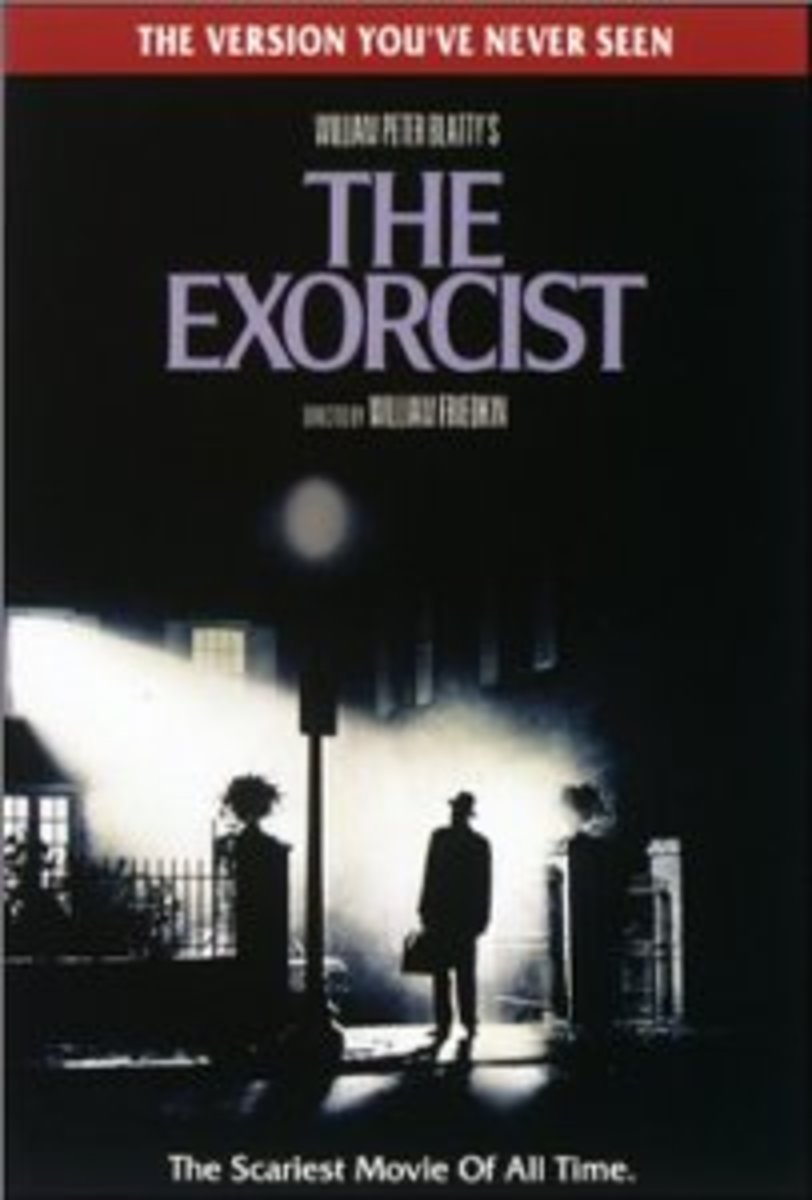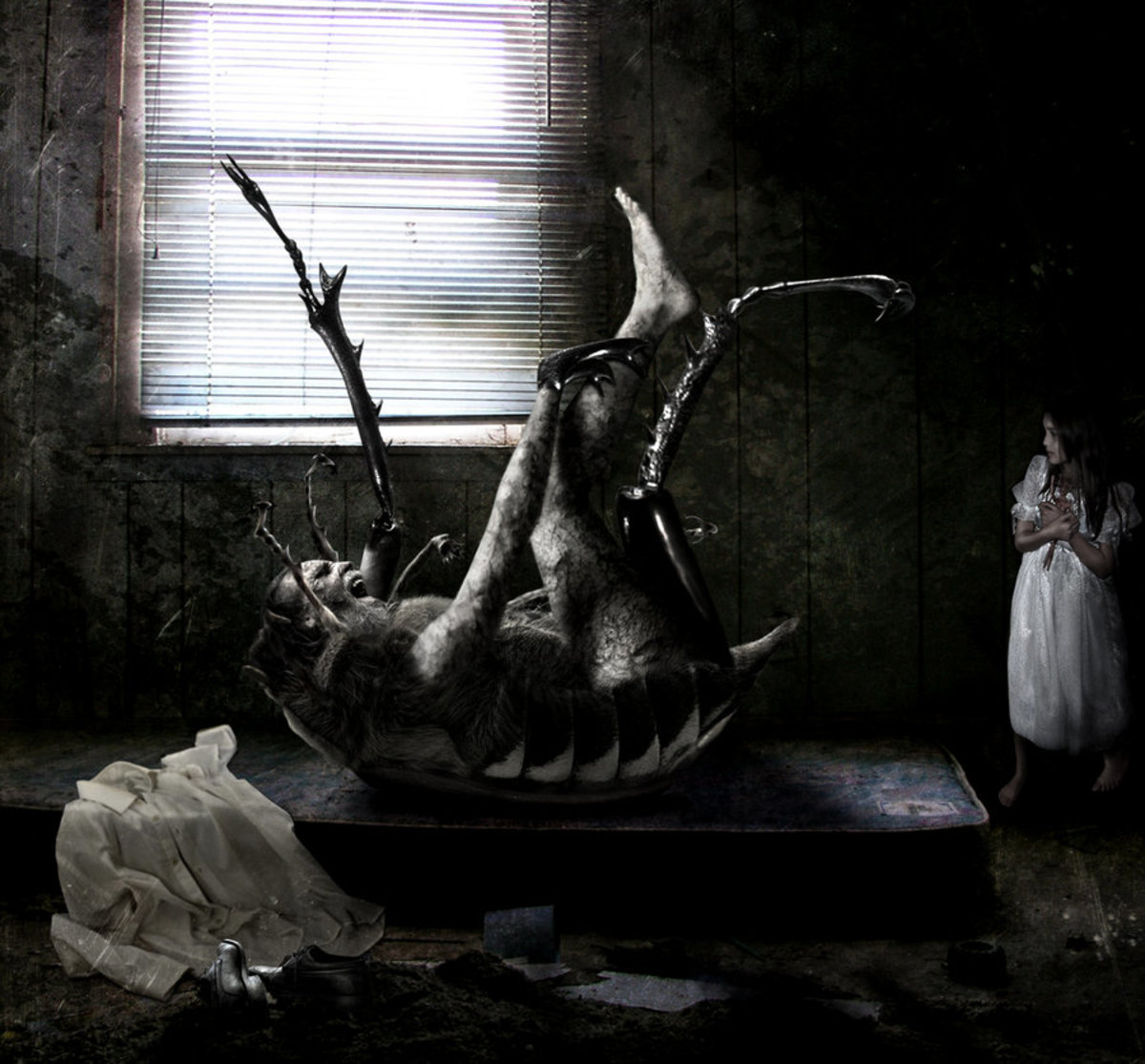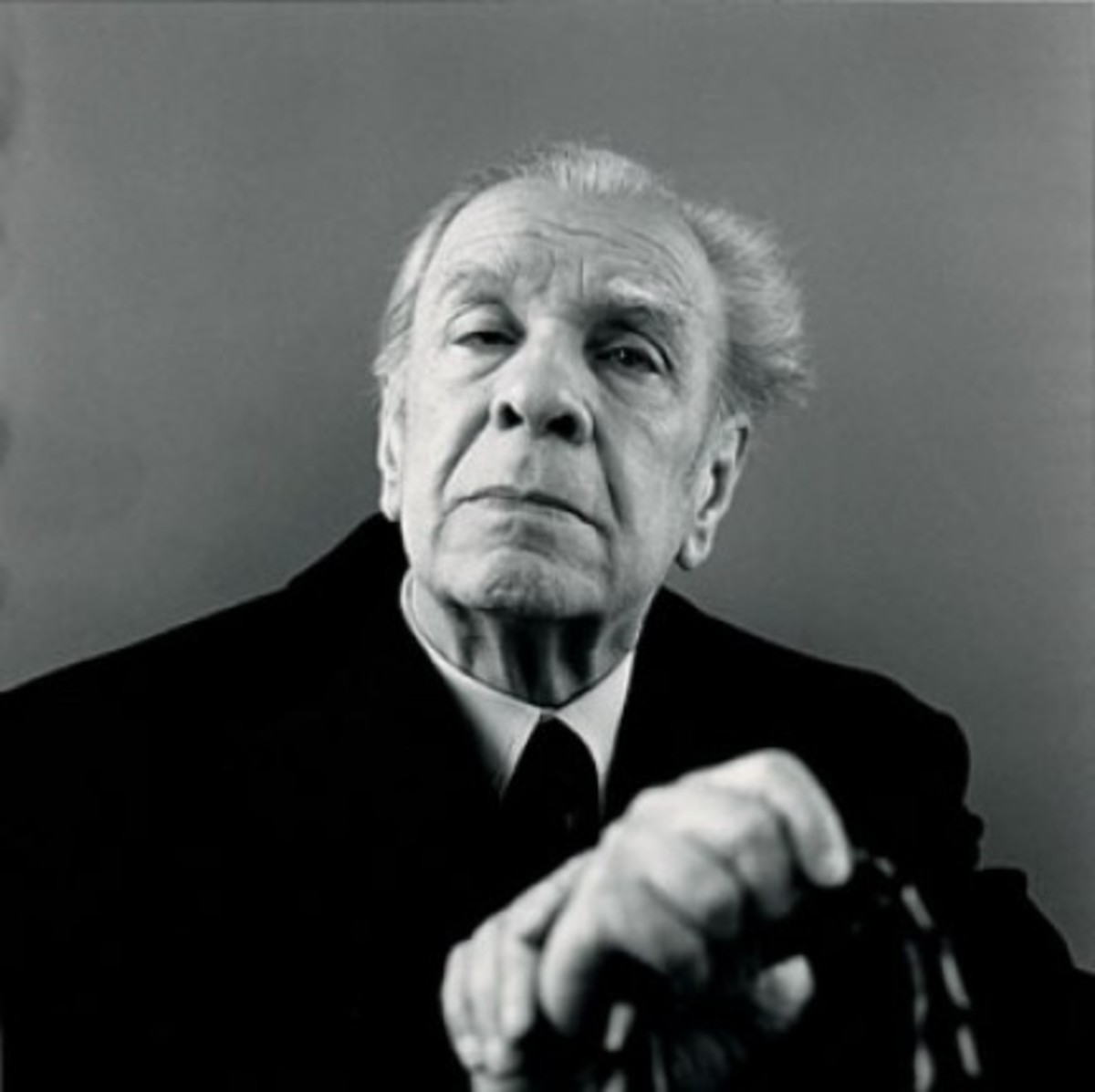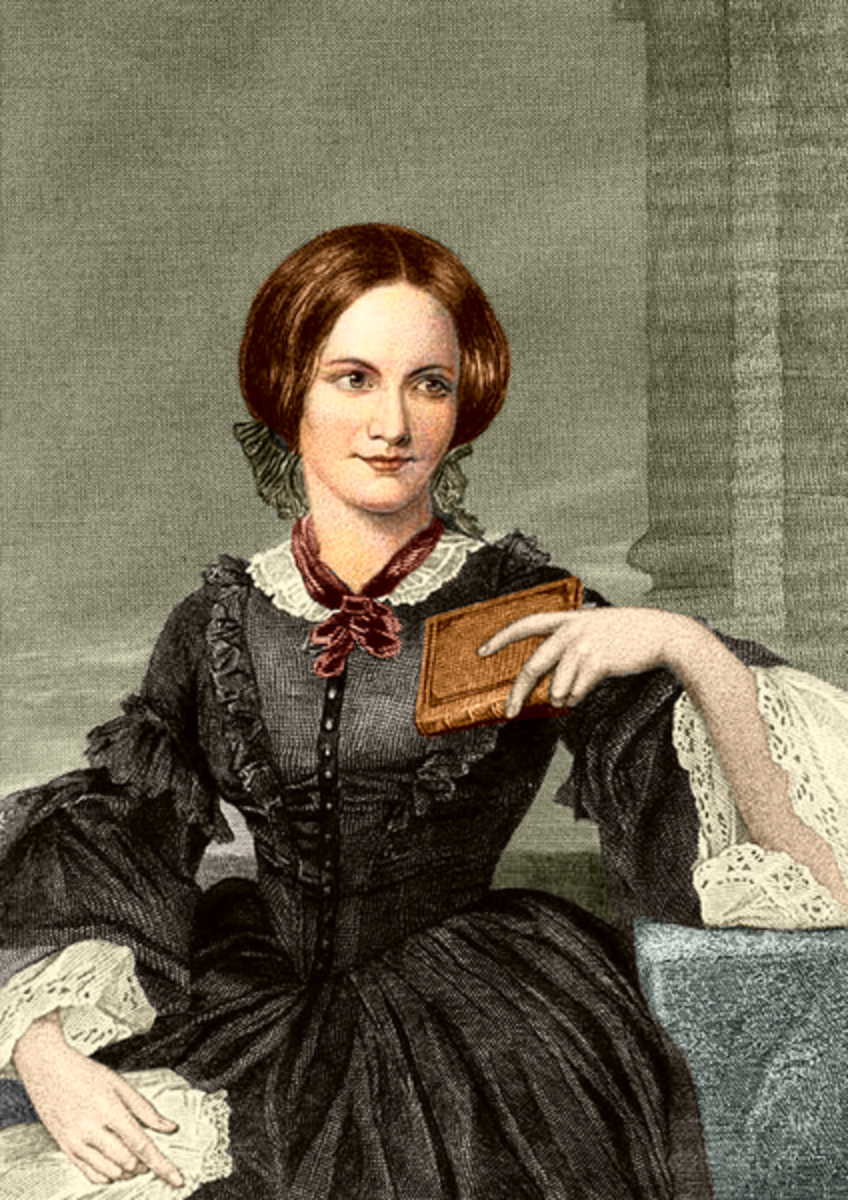- HubPages»
- Books, Literature, and Writing»
- Literature»
- Literary Criticism & Theory
The Exorcist, Ideologies, and the United States, Part II
Chris MacNeil
[Chris had] smelled nothing, but had made up her mind that she would temporize, at least until the appointment with the doctor. She was also preoccupied with a number of other concerns. One was arrangements for the dinner party. Another had to do with the script. Although she was wildly enthusiastic about the prospect of directing, a natural caution had prevented her from making a prompt decision. (Blatty 72)
Chris MacNeil is the epitome of the modern woman as defined by 1970s culture: smart, savvy, and self-sufficient. Divorced, she is responsible for supporting not only herself, but her daughter, Regan, as well, with no discernible assistance from her ex-husband. Chris is also essentially the head of her own corporation and must contend with her draining finances, a brief commentary on the substandard state of the United States economy in the 1970s. Recent financial endeavors have not proven to be lucrative. Taxes, employee salaries, and donations further consume Chris’s capital. She cannot purchase a new car because, despite her wealth and status, she simply doesn’t have the money. Chris is responsible and with this responsibility comes a price; as indicated by the above excerpt, her attention is allocated among many different roles: she is to be the mother, the father, the hostess, the director, the accountant, and the businesswoman. She is to be all of these things and more, and she must execute them successfully.
As soon as she is introduced, it is clear that reason defines Chris MacNeil. As she methodically searches for the source of the annoying and unexplained rapping that interrupted her script rehearsal she recalls one potentially troubling experience:
Once, in the mountains of Bhutan, she had stared for hours at a Buddhist monk who was squatting on the ground in meditation. Finally, she thought she had seen him levitate. Perhaps. Recounting the story to someone she invariably added ‘perhaps’. And perhaps her mind, that untiring raconteur of illusion, had embellished the rappings (Blatty 26).
Chris MacNeil relies strongly on what she can observe; there is no room in her ordered life for the existence of the supernatural or paranormal. The rappings are reduced to rats in the attic. Regan’s cold room, complete with hot radiator and closed window, must mean that Chris is sick. Regan’s missing dress that inexplicably appears “crumpled in a heap on the floor of [Chris’s] closet” (Blatty 44), is explained away as an unintentional error on Chris’s part. She is simply unable to accept anything beyond a rational explanation. She is also an avowed atheist, which adheres to her need to be shown since the existence of God cannot be proven by observation.
What the “levitating monk” passage suggests, however, is that Chris does not trust what she sees; she “thought [italics mine] she had seen him levitate. Perhaps.” Disbelief is a two-pronged opposition – if disbelief is possible then so is belief. Perhaps she did see the monk levitate. But perhaps she did not. Likewise, perhaps her mind had overstated the rappings. But perhaps it had not. When contemplating the source of the rappings, Chris initially considers that her “somnolent mind” was possibly “imposing order on the rattlings of heating pipes or plumbing” only to declare, “Bullshit! I heard it!” (Blatty 26). Christ’s repeated use of words associated with the mind – from the above quoted passage: “thought”, “her mind, that untiring raconteur of illusion” – suggests that whatever she cannot verify by observation and independent means will invariably be cast aside and discounted as a trick of the mind. This is what happens when Chris is confronted with Regan’s “fantasy playmate”, Captain Howdy (Blatty 52). She muses:
[Regan] had loved her father deeply, yet never had reacted visibly to her parent’s divorce. […] Maybe she cried in her room… […] Chris was fearful she was repressing and that he[r] emotions might one day erupt in some harmful form. Why ‘Howdy’? For Howard? Her father? (Blatty 52)
Chris cannot conceive of the possibility of associating Captain Howdy with the supernatural, not even taking the history of the Ouija board into account as a means of associating with the paranormal. She, herself, had purchased the Ouija board as “a possible means of exposing clues to her subconscious” rather than for use as a tool to contact the spirit world (Blatty 51). For Chris, Captain Howdy is nothing more than a result of Regan’s mind attempting to assimilate the absence of her father, and while Chris’s own struggle with abjection is not initially fully evident, it is apparent that the ultimate struggle with the potential dissolution of boundaries between the self and the other – between what beliefs define her at the onset and her subsequent attempts to incorporate the opposing viewpoint – is aptly foreshadowed.
The Washington Post 4/14/15 Interview with William Peter Blatty
- William Peter Blatty talks literature, life after death and lousy movies - The Washington Post
“The Exorcist” author’s new book argues that his late son has been sending messages from the grave.
Father Damien Karras
He was suddenly away that he wanted to impress her. Why? He wondered; and immediately saw the answer in the slums of his boyhood, in the balconies of theatres on the Lower East Side. Little Dimmy with a movie star. (Blatty 218)
Father Damien Karras represents a different class of people than Chris MacNeil: the poor and the immigrant. As a first-generation American, he would not be far removed from both the poverty and the ethics of “sweat equity”, hard work, and doing what must be done in order to survive. Of his youth, he could “remember evictions: humiliations: walking home with a sevenths-grade sweetheart an[d] encountering his mother as she hopefully rummaged through a garbage can on the corner” (Blatty 62). Father Karras is ashamed of his upbringing and filled with guilt for having left his mother alone in order to enter the priesthood and improve his social status. As the brief excerpt above suggests, he has removed himself from his impoverished childhood, but he has not been able to remove the stigma of his upbringing from the core of who he is. Upon his first meeting with Chris MacNeil, he is intent on making sure she knows that he is as good as she is, though further reflection reveals that it is himself he needs to impress; to accept that, despite having grown up poor, his worth is just as valid as Chris MacNeil’s.
Julia Kristeva states that “refuse” signifies what has been “thrust aside in order to live” (3). When Father Karras is approached by a “gray-stubbled derelict numb on the ground in a pool of his urine” he could not “bear to search for Christ again in stench and hollow eyes; for the Christ of pus and bleeding excrement, the Christ who could not be” (Blatty 60). Father Karras, despite remove from the abject poverty of his youth, feels the most shame and disgust when confronted with anything that reminds him of his upbringing and, most importantly, of his mother whose eyes he avoids because they are “wells of sorrow, eyes that spent days staring out of a window” (Blatty 60); the eyes of his mother reflected in the “hollow eyes” of the derelict. His mother rejected for God, the Father.
Kristeva contends that Christianity is “an immediate transference to the nourishing, loving, protective maternal body become paternal sign” (126). Father Karras fled the conflicted relationship with his mother into the loving arms of God, but “the love had grown cold” (Blatty 62). Father Karras’s relationship with God directly mirrors his conflicted relationship with his mother, inducing his crisis of faith. Kristeva also states that religion makes available three important non-tangibles: meaning, security, and love. If these were lacking in Father Karras’s childhood, his entering the priesthood would have initially provided them. When religion can no longer provide them, he must search for them elsewhere. Kristeva asserts that psychoanalysis can be a secular replacement for religion, despite their differences (Oliver 125), which may explain Father Karras’s subsequent studies in psychiatry.
The first glimpse of Father Karras is one of loneliness, isolation, and despair, a point further reinforced when it is made apparent that he is a priest in the midst of a crisis of faith and who constantly struggles with the brutal realities of a life he recognizes far too well. Kristeva states that, in monotheistic religions, abjection is based on exclusion (17). Jesuit Priests are isolated from both their families and from women and, due to concerns of homosexuality, “were also fearful of expressing affection for fellow priests; of forming deep and loving friendships” (Blatty 104). Not only are their families and sexual relationships excluded, friendships are, misguidedly so, as well. A “young moody priest” who has come to see him reminds Father Karras of the “terrible loneliness of priests” (Blatty 104).
And inwardly [Father Karras] raged at this portion of his being that rendered him helpless; that he could not control; that lay coiled within him like a length of rope, always ready to fling itself unbidden at the cry of someone else’s need. It gave him no peace. Not even in sleep. At the edge of his dreams, there was often a sound like a fait, brief cry of someone in distress. It was almost unaudible (sic) in the distance. Always the same. And for minutes after waking, he would feel the anxiety of some duty unfulfilled. (Blatty 104)
As Chris MacNeil is defined by reason, Father Karras is defined by emotion, though on the surface it may seem otherwise—he is aloof, sarcastic. He sees the loneliness and isolation in other people, but does not seem to fully recognize it within himself: it is distant, his recognition of it cool and rational, deceptive. Father Karras, however, is enslaved by his empathy; by his ability to not only recognize suffering in his fellow man, but to also absorb their suffering into his own; he shoulders their burdens so they will not have to. This empathy is so much a part of who he is it is an automatic response over which he has no control. As a priest, it would be his responsibility to look after spiritual lives, as a counselor, emotional states. The combination of the two exacerbates his crisis of faith and his own sense of despair; he cannot and will not address his emotional turmoil at the expense of others. And while his helplessness angers him and causes him anxiety, the passage suggests that the attributes that make Father Karras a good priest—namely benevolence and self-sacrifice in spite of his anger and doubt—are also at the root of his conflict.
At times, religion has been associated with the poor and uneducated—a myth of an omniscient Father God for those who do not have the education to reason for themselves and a way for the church, at the height of its power, to rein in its parishioners. Father Karras, however, is a priest educated at the finest universities that would normally have been accessible only to the wealthy—Harvard, Johns Hopkins, Bellevue—paid for by the Jesuits after attaining priesthood. It is his medical education and psychiatric training that guides Father Karras into the realm of reason that, opposed to his natural state of being emotionally defined, complicates his already existing fracture. The very nature of priesthood relies on faith and emotion, the antithesis of science; the existence of God cannot be proven true or untrue by scientific exploration nor validated by rational thought. Yet because Father Karras is trained in rational thought, he rejects his own nature. He strives to maintain emotional distance, to ferret rational cause and effect, but is ultimately unable to fully disconnect because of the enormity of his empathy for other people and their burdens.
Rejection of the Essence
Jamie. A lingering infection. Chris’s doctor at that time had prescribed a new, broad-spectrum antibiotic. Refilling a prescription at a local drugstore, the pharmacist was wary. ‘I don’t want to alarm you, ma’am, but this... Well, it’s quite new on the market and they’ve found in Georgia it’s been causing aplastic anemia in...’ Jamie. Jamie. Dead. And ever since, Chris had never trusted doctors. Only Marc. And that had taken years. (Blatty 67)
He’d looked through the port at the windowless room with the naked light bulb hanging from the ceiling; padded walls; stark; no furniture save for the cot on which she raved. (Blatty (102-103)
The field of medicine poses interesting dilemmas for both Chris MacNeil and Father Karras and further illustrates the class differences that exist between them. Chris does not trust doctors and, by association, medicine. Her constant questioning of the doctors for full explanations and verifying at every opportunity that a therapist is not the answer belies her distrust. She reluctantly, and only at the insistence of the one doctor she does trust, decides to admit Regan to the care of medical personnel in order to discover what cause Regan’s abrupt disintegration into chaos. In order to do so, Chris has to disregard her empirical distrust of doctors and place her faith in an area for which she has none and her decision firmly thrusts her into the battle of opposing forces. Chris’s insistence that Regan’s behavior is based on Regan’s desire for attention is countered by a “blistering statement” by her doctor, Marc, on the subject of psychosomatic illness and how physical ailments can be misinterpreted as mental illnesses (Blatty 67). She shifts away from her reason into the realm of cold, hard fact and in doing so separates herself from that which defines her. Despite the fact that Chris can afford the best doctors and the most expensive tests, when medicine fails to determine the cause of Regan’s symptoms, it will push Chris closer to that which she wholly rejects: religion. Like Father Karras, Chris MacNeil is searching for meaning, security, and love. After Jamie’s death Chris “had sworn she would not give herself ever again as she had to Jamie; as she had to his father, Howard MacNeil” (Blatty 29). She loves Regan, but Chris is constantly separate from her, leaving her with Sharon or the housekeepers, Willie and Karl. When Regan begins her descent into chaos that changes; she sets aside everything in order to save her daughter.
Father Karras rejects and is rejected by science in the form of his mother whose edema has begun to affect her brain. Instead of being taken to a hospital where she can receive appropriate medical treatment, she is thrust into a psychiatric ward at a public hospital because “a regular hospital won’t put up wit’” her “screamin’ things” (Blatty 102). In contrast to Chris MacNeil’s ability to have expensive tests run on Regan, none of which she truly needs, Father Karras cannot afford anything beyond psychiatric treatment for his mother at a public hospital where she will, most likely, be treated as an indigent patient rather than with the best care, and not receive the treatment she needs. Father Karras removed her when it was apparent the treatment was not appropriate, but, unlike Chris MacNeil, he simply could not afford to stop his life in order to care for his mother at home. In large anonymous cities, it is not unheard of for corpses to be found days, sometimes weeks, beyond their expiration. Immigrants and the poor are oftentimes considered “throwaways”—people no one will miss. When Father Karras’s mother’s death is discovered a couple of days after she’d died—alone—Father Karras’s guilt intensifies. His job as a priest is to put other people before himself, and yet he was unable to fulfill that duty for his mother.
Chris and Father Karras are moving in opposite directions in order to obtain what they desire: Chris from the secular to the sacred—she has ruled out first medicine then psychiatry before she attempts to find the answer in religion—and Father Karras moves from the sacred to the secular—he must use the church’s evidentiary procedures of differentiating between demonic possession and mental illness before moving towards psychiatry and science. It is this dichotomy that attempts to force reconciliation between the two (sacred and secular)—to find common ground where both can reside. It is also the catalyst that threatens to tear each of them in two. Chris MacNeil and Father Karras both reject that which is the essence of who they are: Chris, her reason, and Father Karras, his emotion. It is this rejection—the rejection of self—that works to negate that which “laid the foundation of [their] own being” (Kristeva 5). In Regan, they have the possibility of finding the answers they seek.
Regan MacNeil
Kristeva states that “abjection is above all ambiguity” (9) and the ambiguity in The Exorcist is never fully resolved. Regan symbolizes each opposing force that both Father Karras and Chris MacNeil embody: love/non-love, reason/emotion, religion/atheism, conservatism/liberalism, etc. She is the blank slate in whom the dissolved borders reside and compete for control: the 1970s as the struggle between 1950s conservatism and 1960s liberalism continues; her mother, Chris, as she struggles with atheism and religion, reason and emotion; Father Karras as he struggles with the same. For each outcome that appears to have been determined, there is another that indicates it has not. Father Merrin, the acclaimed exorcist, dies at the hands of the demon—presumably evil has triumphed over good—and yet Father Karras succeeds in eliminating the demon’s possession of Regan. Based on Regan’s demonic possession and the church’s role in removing that threat when science and reason failed, one would think that Chris would no longer be an atheist, but when question by Father Dyer she states, “’as far as God goes, I am a non-believer. Still am. But when it comes to a devil […] I could buy that.” (Blatty 361) Father Karras sacrifices himself for Regan—finally protecting the innocent without misplaced anger or resentment—and while there are hints that his faith in God is restored, it is never clearly states. Oppositions will continue to struggle until the next battle fully commences. Regan begins tabula rasa and returns to the same state after the battle has subsided. Nothing is resolved and the future is to be determined. Regan, symbolic of the next generation, will decide which direction the sequel will follow.
Works Cited
Blatty, William Peter. The Exorcist. London: Transword Publishers. 2007.
Kristeva, Julia. Powers of Horror: An Essay on Abjection. New York: Columbia University Press. 1982.
Oliver, Kelly. Reading Kristeva. Bloomington: Indiana University Press. 1993.
Pearson Education Companion Website: Making a Nation: The United States and Its People. “Chapter 29: Living with Less, 1968-1980”. 1995-2008. <http://wps.prenhall.com/st_boydston_copy/8/2188/560166.cw/index.html>


